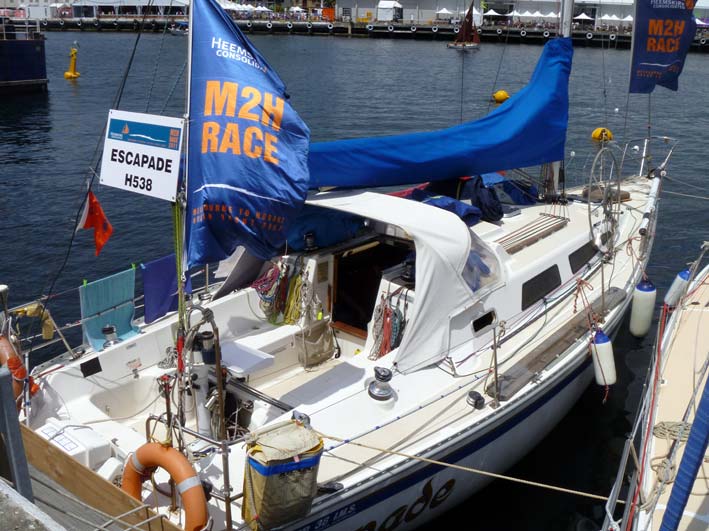Escapade lies at the Elizabeth Street Jetty, in the centre of Hobart, beneath the buttress of Mount Wellington, and crowds of Hobartians promenading around the docks. The fleet have mostly sailed for home, and we are busying ourselves with last minute preparations. The day begins at the Daci Bakers, a fabulous French bakery at the docks with a bowl of toasted granola, fresh berries and yoghurt, orange juice and a coffee that contains Arabica and no hint of the bitter accursed Robusta sadly favored by so many coffee houses. They offer a simple but delicious French breakfast menu of baguettes with cultured butter and jam, avocado on bread, muesli and Danish and Viennoise passtries. They bake sourdough every bit as good as Poulains in Paris, and I grab some loaves for the boat.
Restaurant offerings in Hobart are very good, and getting better. Sadly the oysters are spawning at this time of year and are not at their best, because when they are good they are sublime. This year we didn’t make the trek down to Prosser’s in Sandy Bay, arguably Australia’s finest seafood restaurant, but we did manage a wonderful dinner at Smolt, Tassal’s shop window in Hobart. The tasting platter was a joy, the quail wrapped in crispy proscuitto was stunning washed down with a full bodied La Montessa Spanish Tempranillo, but the duck was sadly tough and rubbery. Our crew dinner was at Methes Taverna in Salamanca Place, always a safe bet, my favorite is their grilled octopus.
To provision, I have chosen to stock up on condiments, add a few tinned items, plenty of fresh greens, and hope we haul in plenty of fish as we go. The man in the tackle shop who sold me a rod tells me there are plenty of tuna at the 300 foot depth contour in the Tasman Sea. He reckons its best to trawl for them at eight knots to avoid “undesirable species” . We are lucky to maintain eight knots in a twenty knot wind with a spinnaker set, so I guess we’ll be attracting some “undesirables”. There are supposedly Yellowtail Kingfish up north, and lots of squid and flathead to be had in the bays.
Robert has been busy splicing cord and performing general maintenance jobs about the boat, and Aimee has been sightseeing Battery Point with its delightful Georgian Village atmosphere. At 14.00 we put to sea, and against a 25 knot headwind we motor around to the Derwent Yacht Squadron in Sandy Bay to fuel up. We then head out into the wide Derwent estuary, William Bligh once wrote that this splendid waterway could comfortably hold a thousand ships of the line at anchor. Today all there is at anchor is a couple of empty bulk traders, bows into the wind. Three hours later we drop anchor in Bull Bay, a delightful sheltered inlet right at the mouth of the Derwent Estuary on the north east end of Bruny Island. We look up to sheep grazing on the hills above the bay, and across the estuary to the lighthouse known locally as the Iron Pot, the gateway to sheltered waters for yachts coming in from Storm Bay, the welcoming beacon to Hobart. Some welcome it gave us this year in the race. We were running second in the AMS handicap and flew past the Iron Pot at around 23.00 straight into a wind hole, where we sat becalmed for hours, crossing the finishing line 4 hours later and in second last place. They say the race is won or lost in the Derwent. For us this year it was lost there, however we had a great sail and sailed well.
Fortune however smiled upon us in Bull Bay, Robert landed three squid, so dinner was tempura squid on a mixed lettuce and tomato salad with a lime dressing, which we washed down with a Golders 2008 Pipers Brook Chardonnay which was delightful. I am steadily becoming a big fan of Tasmanian white wines.

